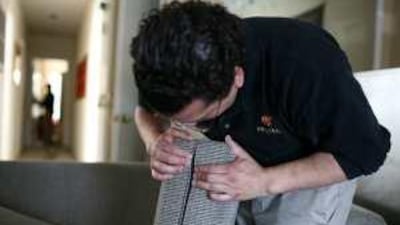ABU DHABI // Bedbugs are on the march, sparking sharp increases both in business for pest control firms and in hospital visits by people who have been bitten. While they thrive in labour camps and high occupancy dwellings, the bugs, which feed on human blood, are moving increasingly into single-family homes, and are thought to be growing more resistant to pesticides. Pest control companies have reported an increase in call-outs, with more and more coming from apartments and villas. Hospitals have noticed a significant rise in the number of patients with severe allergic reactions to bedbug bites.
BC Pereira, the operations manager at Invaders, a Dubai pest control company, said: "In the summer the problem gets much worse and we get between 10 and 15 per cent more requests than in the rest of the year. It's really bad in the labour camps, but it is spreading." Dr Wesam Kadhum, a dermatologist at the Gulf Medical College Hospital in Ajman, said he saw at least four or five patients every day complaining of bites.
"Some don't realise what they are," he said. "Others are embarrassed and don't want to say. It is not always easy for people to know that their bites are from bedbugs. This is why people do not always know they have a problem until there are a lot of bites and a lot of bugs." The bugs, about 5mm long, can hide in mattresses and bed frames, under bed bases, in skirting boards, wall sockets and even paintings. They can also be found in furniture and wardrobes.
They tend to venture out at night looking for blood. Although they can live for up to 18 months without food, they usually feed every five to 10 days. Itchy bites are a reaction to the anaesthetic that the bugs inject as they suck blood. Once an infestation has taken hold, it is difficult to eradicate and many households need repeat treatments to exterminate the bugs. Santosh Balachandran, operations manager at Pest Management Consultants Middle East, based in Dubai, said a bedbug invasion could start with just one or two eggs. "The problem is they are very difficult to get rid of, and they are everywhere at the moment," he said
"They are probably in all public spaces like cinemas and taxis. It doesn't mean you are unhygienic. But once they are in, it is very hard to get rid of them." Mr Balachandran said he inspected his own house thoroughly once a month and was always careful when returning from public places. "As for health issues, there is only a problem if people are allergic and they get some kind of reaction. Humidity is also a factor."
In crowded accommodation, such as labour camps, bedbugs were almost inevitable because of the living conditions, he added. Dr Kadhum said: "They are not linked to being clean or dirty; they are just very easily brought into the home." It was a common misconception that the bugs could spread disease, he said. "This is not actually true. This used to happen with other types of bugs, but it is not really a possibility any more."
Khaled Obaid, an engineer for Alphamed, a company contracted by the Abu Dhabi Municipality, said bedbug infestations were spreading. "It really is a problem, and, while we are not suffering in all places, the worst problems are in the labour camps," he said. "Because of their living habits, they live in crowded accommodation, there is a lack of hygiene and it can become quite humid. The windows and doors are closed and, with some air-conditioning units not working, it is so humid."
The bugs were attracted by carbon dioxide and heat, said Mr Obaid. "They move around easily and can spread in cars and handbags. There have even been cases in hotels because many people use the rooms." The bugs were hard to control, said Mr Obaid, but there were many ways to prevent them entering your home and to get rid of them. People who found bedbugs in their homes should leave their mattresses and blankets in direct sunlight. Mr Obaid also advised them to plug any holes in the walls of their apartments so bugs could not crawl in and to keep areas clean. "Just by doing that would solve more than 80 per cent of this problem," he said. "When it comes to what I can do if there is a problem, I can use chemical treatments."
The number of infestations across the world has risen dramatically in the past decade. Experts put this down to increased foreign travel and, possibly, to the bugs becoming resistant to certain pesticides. The UK recently reported an increase in bedbug cases, particularly in London, where infestations have spread into more middle-class areas such as Hampstead. munderwood@thenational.ae asafdar@thenational.ae

